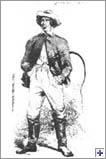|
||||||
White
Trash
What is: Hick, Hillbilly, Yokel, Country Bumpkin, Cracker, Trailer Trash, Redneck. These are labels used to perpetuate a stereotype of a specific culture within American society. Contrary to popular belief, America is not the tolerant, classless society it claims to be. For centuries, it has steadily remained acceptable to lampoon and demean the culture of the rural, working-class Southerner. Even now, in the age of political correctness, it is considered tolerable and even appropriate to ridicule persons with the above distinctions - to generalize them as ignorant, unintelligent, eccentric, crude, unattractive, lazy, racist, alcoholic, religious to the point of absurdity, inbred, and prone to violent behavior. This is not to say that there are no rural Southern people possessing these characteristics. However, because it is repeatedly portrayed in literature and the media, the redneck stereotype has grown into a widespread myth which is accepted by many as universal truth. As with most myths which have remained prevalent throughout the twentieth century, the stereotype has been spread mainly through the media of film and television. The typecast characters in movies or television programs can be depicted in one of two ways: negatively,, as ‘white trash’ or in a comparatively positive light, as ‘good country people.’ The former is used as a scapegoat on which to blame society's mistakes. The assumed faults of this group make it socially acceptable to condemn its way of life. The ominous and perverse side to country life has been portrayed in films such as Deliverance and, more recently, Sling blade. Although not as intensely perverse as Deliverance, Sling blade is set in a rural town ridden with ignorant, alcoholic white collar residents . A sharp contrast to the depravity of the demonic; White trash' portrayed in many films, the wholesome impression exuded by good country people is emphasized when society experiences anxiety about modem culture. People long to see a return to tradition when they fear contemporary civilization is moving away from the past, too quickly. Feeling nostalgic for a simpler time, society craves the down-home, patriotic, family value laden, Cracker Barrel kitsch qualities of the good country people.’ This archetype has appeared repeatedly in television shows throughout past decades, including The Andy Griffith Show and, The Walton's. The characters in these shows, although backward and ignorant, are usually moral and good natured, letting the viewers smile at their quaint old ways with a warm (yet condescending) attitude. Still other examples are shows such as The Dukes of Hazard and The Beverly Hillbillies,which do not portray their characters in an entirely negative fight, but show them as not quite able to come up to normal standards. The Dukes are law-breakers battling the corrupt Boss Hog, and the Beverly Hillbillies cannot move up the cultural ladder even after their socioeconomic status has been advanced. Both shows contain sexy yet wholesome young women - Daisy and Ellie May are bimbos, yet remain wide-eyed and innocent.
And so, primarily through movies and television, popular culture has disseminated two stereotypes embodying opposite poles. White trash and good country people manifest exaggerations of alleged traits found in rural working class Southerners - traits that can be scorned or praised as society pleases, without regard to the falsehoods and over simplifications they propagate. The redneck phenomenon is still going strong into the twenty-first century. In the 90's we witnessed the advent of Jeff Foxworthy, whose "You might be a Redneck" jokes have popularized the genre of redneck humor to the point that it appeals to nearly all audiences. It seems that a professing redneck mocking his own people is even more hilarious than ridicule from outside entities. In fact, Foxworthy comes from middle to upper-class stock; he is no true ‘redneck.’ This is further evidence that the joke is not founded on concrete truth. Another current example of redneck humor is the popularity of television series such as King of the Hill. Even though animated, this sitcom appears in some ways to be more realistic than other portrayals. Neither cute nor demonizing, the show irreverently satirizes a wide range of society as well as a Texas family and their neighbors. Although hilarious and in some ways true to life, both Foxworthy and King of the Hill could be considered belittling to working class Southern culture because they enforce the myth. These generalizations are inaccurate myths because they do not acknowledge the intricacies of a culture. Every cultural group exhibits positive and negative characteristics that form its identity, and every individual belonging to that group is unique. It is socially permissible to over-generalize and discriminate against the ‘redneck’ culture because its main distinction - aversion to progress - excludes it from the mainstream. America has become a nation obsessed with the notion of progress at all costs. Rural working class Southern culture, with its moral absolutes, local allegiances, and strong familial bonds is by nature resistant to ‘progress.’ Their unwillingness to adapt to the changing norms of modem and postmortem society has made ‘rednecks’ the subjects of persecution. Unlike other persecuted groups, most rural working class Southerners have made no attempt to fight the attacks on their culture. This may be the result of a laid-back, easy-going manner. Perhaps many are unaware that the ridicule and contempt of their assumed and fabricated traits could result in the total destruction of their true culture - and consequently the abandonment of the actual merits it possesses. Many of these old-fashioned merits - including forthrightness, chivalry, hospitality, and devoutness are unique and valuable. Rural Southerners need to realize they are worth defending. Perhaps the question the rest of America needs to ask itself is: Have we reached the point where anything timeless is considered backward?
www.southernevents.org/legends_of_the_redneck_by_sara.s Crazy Labels, Redneck Labels, White Trash Labels, Trailer Park Trash Labels BSORNOT
Boys will be Boys!
White Trash
Site Map
gallery
Support Our Troops
Redneck Politics
©bsornot.whipnet.net 2005-2016 |
Firefox is Free and considered the best free, safe web browser available today.
|




